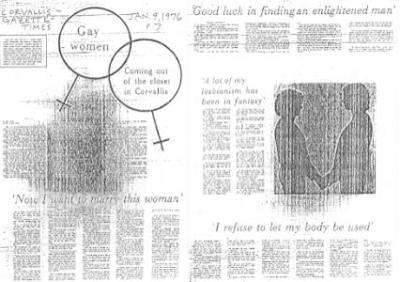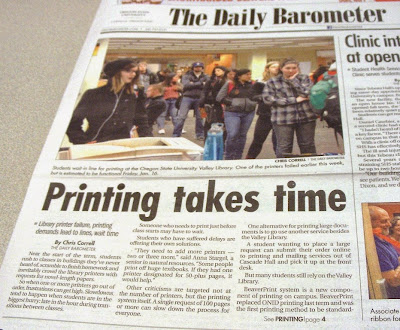PHOTO: The local newspaper printed my opinion piece: Thomas Kraemer, "As I see it: A local retrospective on gay unions," (Corvallis, Oregon) Gazette-Times, Jan. 28, 2015, p. A9 and, perhaps only by coincidence, the editor printed on a previous page an AP story describing how the LDS Mormon Church is trying to tune its message on gay marriage: "Mormon Leaders: Protect gay rights, religious liberties," (Corvallis, Oregon) Gazette-Times, Jan. 28, 2015, p. A7 by Brady McCombs and Rachel Zoll. See previous post Jack Baker gay marriage theory was right (4/8/09)
The news from law professor, Art Leonard, "Supreme Court Grants Four Petitions to Review 6th Circuit's Marriage Ruling," artleonardobservations.com posted Jan. 19, 2015, prompted me to write the following opinion piece, about the decision by the U.S. Supreme Court to look at the conflicting lower court decisions on gay marriage, and it was printed in my small college town city newspaper, which is owned by an Iowa-based newspaper chain:
A January 2015 decision by the U.S. Supreme Court, to reconcile conflicting lower court decisions on same-sex marriages, promises to end the debate that Corvallis citizens have waged for nearly four decades after the Gazette-Times published a two-page feature story titled, "Gay women: Coming out of the closet in Corvallis, 'Now I want to marry this woman,'" on pages 7 to 8 of the Jan. 9, 1976 issue.
This 1976 Gazette-Times article triggered many readers to flood the newspaper with angry letters to the editor asking how "gay marriage" could be mentioned in a "family newspaper" and threatening to cancel their subscription in response.
These readers' violent, angry and homophobic disgust reactions to "homosexuals" did not a surprise me because I had recently arrived at Oregon State University after doing my undergraduate work at the University of Minnesota, where I witnessed the law school student Jack Baker obtain the first decision by the U.S. Supreme Court on gay marriage in 1972, which left it up to state marriage laws.
The 1972 "Baker v. Nelson" decision was recently cited by one of the conflicting lower court decisions as the reason it was required to accept state marriage laws against same-sex marriages.
Other lower courts decided that the 1972 "Baker" decision is obsolete and it conflicts with the Federal Constitutional rights of equal treatment under the law, regardless of gender, plus the right to move between states and still have your legally performed marriage recognized.
In the 1970s, I witnessed Jack Baker be viciously denounced by both mainstream liberals and even gay liberationists because they worried that promoting marriage equality would impede their goals of legalizing sodomy and ending employment discrimination based on sex, which was a goal shared with women liberation groups of the era.
In fact, late as 2004, Republicans were successfully sponsoring anti-gay marriage laws on ballots nationwide, including Oregon, to help re-elect President Bush and other Republicans.
Baker took refuge from his public vilification and maintained a private life by refusing to do public interviews.
These well documented facts, and perhaps some lingering grudges by some reporters and activists, have resulted in Baker's story being completely ignored by the mainstream media.
In a recent personal communication with Baker, I learned that today he is retired and still happily married to the same man, whose job offer, in the 1970s, as a professional librarian at the University of Minnesota, was withdrawn after they discovered he was gay.
As a detailed attorney, Baker also pointed out that his 1970 marriage was legally performed under Minnesota laws, which at the time did not specify gender, and he is still legally married because no court ever ordered it annulled.
Today, both men are working to document their history in a university archive and are helping the author of a proposed book, which ironically could be published by the University of Minnesota Press.
Until recently, Both Baker and I had not read the essay on "homophile marriage," which in 1953 had been published in an obscure academic journal edited by the former Oregon State University Professor W. Dorr Legg, who as a conservative later founded the present day gay Log Cabin Republican group.
Despite Legg's earlier work, I view Baker as a genius, not a lunatic, to have recognized the importance of "gay marriage," as it was called back then, and I look forward to reading the happy ending to his decades-long struggle for justice.
(Quoted from Thomas Kraemer, "As I see it: A local retrospective on gay unions," (Corvallis, Oregon) Gazette-Times, Jan. 28, 2015, p. A9)
Also, see my previous post More examples of the 1972 Baker gay marriage case being ignored by history (1/14/15), which in response, Jack Baker emailed me a link to a good article on his 1972 case: Roger Parloff, "12 key moments that led to the Supreme Court's same-sex marriage case, Here, in a nutshell, is the 42-year backdrop for the Supreme Court's upcoming ruling on gay marriage." fortune.com posted January 18, 2015. Baker also referenced his friend, William Eskridge, Jr. John A. Garver, Professor of Jurisprudence, Yale Law School, who represented a gay couple suing for recognition of their same-sex marriage.
PHOTO: Jan. 9, 1976 feature article by Anne Wood, "Gay women: Coming out of the closet in Corvallis, 'Now I want to marry this woman,'" on p. 7-8 of Corvallis Gazette-Times. One of the women profiled in the article came out in a letter to the editor of her student newspaper and she was active in early gay women's groups at Oregon State University. (See previous posts Gay 1976 newspaper controversy (5/3/06) and Thomas Kraemer, "Views on gays same," Corvallis (Oregon) Gazette-Times, Sept. 13, 2005, p. A11). See my previous post Gay 1976 newspaper controversy (5/3/06).
Also see the response to Arthur S. Leonard, "Supreme Court Grants Four Petitions to Review 6th Circuit's Marriage Ruling," artleonardobservations.com posted January 19th, 2015 by Michelangelo Signorile, "Will Justice Roberts Join the Marriage-Equality Majority for All the Wrong Reasons?" huffingtonpost.com posted Jan, 24, 2015 -- Mike says, "New York Law School professor Art Leonard, who has studied Supreme Court legal decisions on gay issues for decades, suggested as a possibility come June: Chief Justice John Roberts joins the majority and writes the decision himself, making it the narrowest possible ruling with regard to the ramifications for LGBT equality beyond marriage."
See previous posts:
- Sunday paper gay marriage advice (1/12/09)
- Jack Baker gay marriage theory was right (4/8/09)
- Life Magazine gay marriage 1971 (11/20/08)
- Gay 1976 newspaper controversy (5/3/06)
- "Views on gays same," Corvallis (Oregon) Gazette-Times, Sept. 13, 2005, p. A11
PHOTO: May 18, 1970 Michael McConnell and Jack Baker were married by Hennepin County Minnesota Justice of the Peace. (See Ken Bronson, "A Quest for Full Equality," www.may-18-1970.org self-published May 18, 2004, p. 6-7, 48 (PDF) from Ken Bronson's Web site www.may-18-1970.org on Jack Baker's marriage and my previous post Life Magazine gay marriage 1971 (11/20/08))
 PHOTO: Laws against same-sex marriage would not be passed until decades later. ONE Magazine was also ahead of the time when it mentioned the idea of "homosexual marriage" in 1953 long before "gay marriage" or same-sex marriage become a cause of some gay liberationists. (See James T. Sears, PhD, "1953: When ONE Magazine, Headlined 'Homosexual Marriage,'" GayToday.com posted Aug. 11, 2003 and my previous post Gay free speech victory 50th anniversary (1/18/08))
PHOTO: Laws against same-sex marriage would not be passed until decades later. ONE Magazine was also ahead of the time when it mentioned the idea of "homosexual marriage" in 1953 long before "gay marriage" or same-sex marriage become a cause of some gay liberationists. (See James T. Sears, PhD, "1953: When ONE Magazine, Headlined 'Homosexual Marriage,'" GayToday.com posted Aug. 11, 2003 and my previous post Gay free speech victory 50th anniversary (1/18/08))
UPDATE: 5/26/15 - See previous post Baker marriage hits N.Y. Times front page only 4 decades late (5/15/15) that includes a copy of my letter to the editor: Thomas Kraemer, "Some intriguing history on same-sex marriage," Gazette-Times, May 26, 2015, p. A7 and Editor's note: The Jan. 28 "As I see it" is available at http://tinyurl.com/k5q5y3z. The New York Times article is available at http://tinyurl.com/mtpbz9s.








